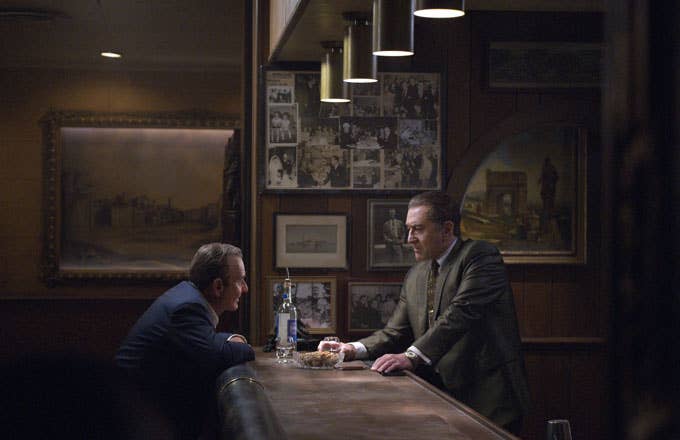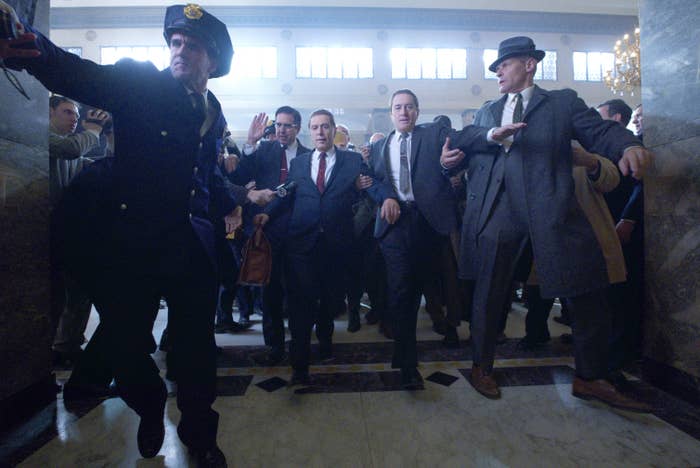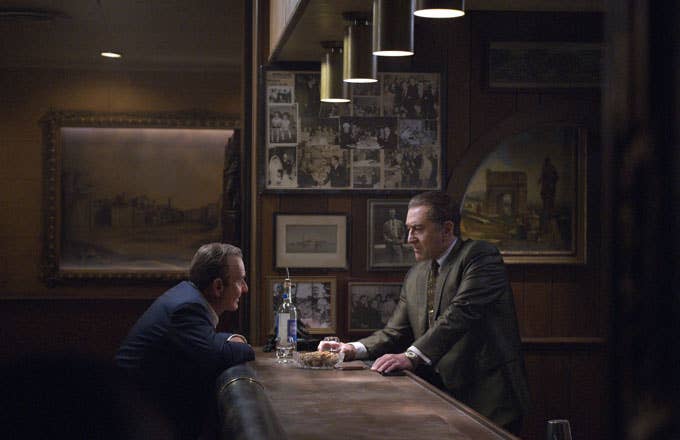
Casino has the car exploding. Goodfellas has a guy’s stomach getting butterflied. The Irishman, Martin Scorsese’s brand new mob epic, has a much more measured opening, one that’s reflective of the movie as a whole. Scorsese and the co-lead connective tissue of all three films, Robert De Niro and Joe Pesci, are all 76. Al Pacino, the newcomer to the troupe, is 79. These are old men, and if Scorsese had tried to use the film’s much-ballyhooed de-aging tech to recapture the glory days of three decades ago, The Irishman might have suffered for it. Thankfully, the GOAT isn’t concerned with recreating those classics; as a result, The Irishman is a companion piece that forms a marvelous incidental trilogy when placed alongside them.
The inevitable urge to compare the three goes beyond cast and genre. Much like its predecessors, the film is a decades-spanning lifetime journey that uses the mafia as the context to chart the rise and fall of careers, friendships and families while exploring themes of loyalty, status and responsibility. The Irishman, with its golden age perspective, adds mortality and legacy to that list. Years later, when the mob ranks are climbed and the bodies are buried, what does it all really add up to? How much of an achievement is it to have children that want for nothing if the price is an actual relationship with them?
It is, somewhat surprisingly, a much more sentimental film than one might expect—and often laugh-out-loud hilarious. De Niro is Frank Sheeran, the titular taciturn enforcer who finds himself on the periphery of some of the ‘60s’ and ‘70s’ most seminal historic events as a result of being in the middle of the Bufalino crime family and Jimmy Hoffa’s prolific tenure as Teamsters union president. Both at their peak, both from a mix of fate, inevitability and pride, collide to form a slow-simmering storm in which Frank finds himself at the center. Save for a somewhat slow and clunky opening, Scorsese, working from a crackling adapted screenplay from the legend Steve Zaillian and a thoroughly stacked cast (supporting members range from Harvey Keitel and Ray Romano to Bobby Cannavale and Jesse Plemmons, alongside mafia-fiction mainstays like Stephen Graham) is firmly in his bag, deftly weaving Frank’s story as it develops through the decades with his trademark tracking shots, montages and slo-mo. (The film releases to Netflix Nov. 27 after a limited theatrical run starting Nov. 1. It should go without saying but yes, if you can, definitely see a new Martin Scorsese movie on the big screen first.) He even plays around with timelines, framing the story as flashbacks interspersed throughout a road trip. And when they finally connect, the emotional weight of the situation lands with devastating impact.
Much has been made of the CGI effect used to de-age the principal cast; it isn’t as distracting as the trailers and teaser stills have implied. Sure, a few of the early-early scenes have a, shall we say, Zemeckis Polar Express sheen to them. But we’re far from the Henry Cavill Justice Stache peaks of Uncanny Valley. There are some realities even CGI can’t de-age, though—in a post-screening panel, Scorsese noted posture plays a role in playing young as well, recalling a take where he had to remind Pacino to rise out of a chair “like a 49-year-old.” (Upon Take 2, Scorsese said the 79-year-old had managed to get down to a 62.) For all the facial CGI on an early scene (narratively and chronologically) that finds Frank beating a man on the street, it’s impossible not to view it as De Niro throwing out feeble old man kicks. Those are quibbles though, the cast is right there with their director operating at top notch. Pesci, for all his grumbling about semi-retirement, slips back into his unique mix of casual charm, menace and quick-witted retorts like he never left. But he’s not the violent firecracker we’d expect from him typically. As Russ Bufalino, he doles out harm and orders more—but, more often than not, with a heavy heart and even remorse. In the interim, he urges Frank not to lose his compassion, or it’s all for naught. De Niro’s Frank, by design, is of few words and expressions (at one point someone literally says to him, “You never show your feelings,” but De Niro does the most within the character’s boundaries, all while delivering some of the best, funniest line deliveries of his career.

The film is essentially a posse cut, and once everyone sees it, debates about who had the best verse will inevitably rage on all the way through awards season. For my money, it’s Pacino, who plays Hoffa with boisterous magnetism, fatalistic pride, and, opposite De Niro and one of Frank’s daughters (later played by Anna Paquin), unexpected warmth. Hoffa gives the movie its heartbeat; he arguably could stand to come in sooner. Nevertheless, Scorsese and the cast fill his inevitable tragedy with such gravitas you almost wish for a Tarantino-style revised history swerve.
But The Irishman deals in cold, hard truths. One of which being, for the umpteenth time now, most other directors couldn’t get Scorsese’s shinebox. Can’t wait to sit through all 209 minutes again.


